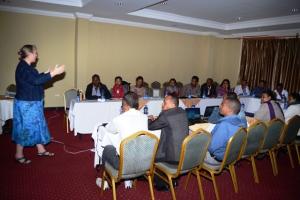Risk Profiling to Assure Better Preparedness in Emergency Preparedness and Response in Ethiopia
BISHOFTU - 10 May 2016 | Ethiopian Public Health Institute (EPHI) of the Ethiopian Federal Ministry of Health (FMOH) in collaboration with the World Health Organization HQ and Country Office in Ethiopia (WCO) trained 30 experts drawn from EPHI, the office of Disaster Risk Management and Food Security (DRMFS), and academia. The objective of the training was to provide a systematic, transparent and evidence-based approach to identify and classify priority risks, to define the level of national preparedness and readiness to mitigate them, and to guide the implementation of a comprehensive and strategic risk assessment to inform preparedness and response plans.
On the occasion, Dr. Kebba Omar Jaiteh, the WCO Emergency Coordinator in Ethiopia, noted that the training is designed to equip the national as well as the sub-national risk management practitioners with systematic assessment tools. “This exercise will help my colleagues in EPHI, DRMFS as well as academia, to be strategically prepared and planed for quick response before emergency outbreak”.
Adrienne Rashford and Mr. Marc Shapiro are from the WHO Headquarters and work in Coordination, Analysis and Partnerships Preparedness Support Team member at the Global Capacities Alert and Response Department that trained the participants. According to Mr. Marc and Ms. Rashford, including the right individuals in this exercise is crucial to obtaining a product that is associated with a high degree of confidence; and appreciated the mix of the participants, as it will help to cascading the tool down to the local level. “The hidden or tacit knowledge of specific individuals within the country and its specific context is a key source of information to drive the assessment of risks,” Mr. Shapiro underscored. “In addition to Ministry of Health officials, this process should include representatives of other relevant ministries (e.g. Agriculture, Interior/Civil Protection, National Disaster Management Agency etc.)” Ms. Rashford added.
Dr. Israel Gebresilassie, WCO Health Security and Emergency Officer in Ethiopia, is the coordinator of the Risk Profiling Training. “In Ethiopia there is an existing disaster risk management system, therefore this training is not to create a parallel system, rather it is to strengthen the system by introducing new instruments and tools that are useful to profile health risks.”
The training highlighted that strategic risk assessments should be conducted at the start of the risk management cycle, and updated regularly and at least on an annual basis and after each emergency response. The first strategic risk assessment a country conducts will represent a significant effort, and the subsequent assessments will draw significantly from the initial product. “In this regard, the FOMH experience must be appreciated. It has conducted a risk assessment and came up with preparedness and response plan that is about to be revised in a month from now,” Dr. Jaiteh noted.
The training was fully funded and conducted by the WHO Headquarters in Geneva and the WCO in Ethiopia. A number of sources of information were drawn upon during the risk profiling process that identified resource prioritization, risk prioritization, capacity assessments, development of preparedness and response plans, and the implementation of preparedness and mitigation, as key activities that stem from risk assessment.
It is to be recalled that the WCO Ethiopia collaborates with the FMOH in conducting the risk assessment. With the current El Nino induced drought, the WCO Ethiopia has repurposed its 60 staff members and hired 10 more technical officers to work on the ground to support the Ethiopian government at national and sub national levels to layout the health, nutrition, water and sanitation (wash) preparedness and response plans.
For more information, please contact:
Mikias Sissay
Communications Consultant
email: sissaym [at] who.int (sissaym[at]who[dot]int)




